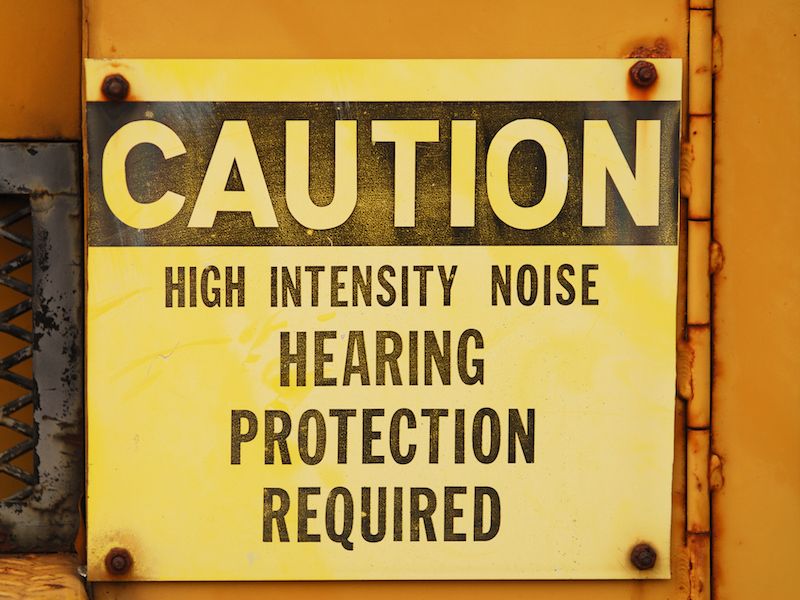
Knowing you should protect your hearing is one thing. Knowing when to protect your ears is a different story. It’s not as easy as, for example, determining when to use sunscreen. (Is it sunny and are you going to be outside? Then you need sunscreen.) It’s not even as simple as knowing when to wear eye protection (Doing some hammering? Working with a saw or hazardous chemicals? Wear eye protection).
It can feel as though there’s a large grey area when addressing when to wear hearing protection, and that can be dangerous. Usually, we’ll defer to our normal tendency to avoid hearing protection unless we’re given information that a particular place or activity is dangerous.
Risk Evaluations
In general, we’re not very good at assessing risk, especially when it comes to something as intangible as damage to the ears or the probability of lasting sensorineural hearing loss. Let’s take some examples to demonstrate the situation:
- Person A goes to a very loud rock concert. The concert lasts approximately 3 hours.
- Person B has a landscaping company. After mowing lawns all day, she goes home to quietly read a book.
- Person C is an office worker.
You might think that person A (let’s call her Ann, to be a little less clinical) may be in more hearing danger. Ann leaves the show with her ears ringing, and she’ll spend the majority of the next day, struggling to hear herself talk. It seems reasonable to presume that Ann’s recreation was quite hazardous.
Person B (let’s call her Betty), on the other hand, is subjected to less noise. There’s no ringing in her ears. So her hearing must be less hazardous, right? Not really. Because Betty is mowing all day. So although her ears never ring out with pain, the damage builds up little by little. Even moderate sounds, if experienced with enough frequency, can harm your hearing.
Person C (let’s call her Chris) is even less obvious. Most people realize that you need to protect your hearing while running machines like a lawnmower. But even though Chris works in a quiet office, she has a really noisy, hour-long commute each day on the train. Also, even though she works at her desk all day, she listens to her music through earbuds. Does she need to think about protection?
When You Should Think About Protecting Your Hearing
Normally, you need to turn the volume down if you have to raise your voice to be heard. And if your surroundings are that loud, you should consider using earplugs or earmuffs.
So to put this a little more scientifically, you need to use 85dB as your limit. Noises above 85dB have the potential to cause damage over time, so in those situation, you need to think about wearing ear protection.
Most hearing professionals recommend making use of a special app to keep track of decibel levels so you will be cognizant of when the 85dB has been reached. These apps can tell you when the surrounding sound is approaching a hazardous level, and you can take appropriate steps.
A Few Examples
Even if you do download that app and take it with you, your phone may not be with you everywhere you go. So we may establish a good baseline with a couple of examples of when to safeguard our ears. Here we go:
- Every day Chores: We already talked about how something as straightforward as mowing the lawn, when done frequently, can call for hearing protection. Chores, like mowing, are most likely something you don’t even think about, but they can lead to hearing damage.
- Commuting and Driving: Do you drive for Lyft or Uber? Or maybe you’re just waiting downtown for work or boarding the subway. The constant noise of living in the city, when experienced for between 6 and 8 hours every day, can cause damage to your ears over the long haul, particularly if you’re turning up your music to hear it over the commotion.
- Listening to music with earbuds. OK, this doesn’t call for protection but does require care. Give consideration to how loud the music is, how long you’re listening to it, and whether it’s going directly into your ears. Consider using headphones that cancel out outside noise so you don’t have to turn up the sound to dangerous levels.
- Exercise: You know your morning cycling class? Or even your nighttime Pilates session? You may consider wearing hearing protection to each. The high volume from instructors who play loud music and microphones for motivation, though it might be good for your heart rate, can be bad for your ears.
- Working With Power Tools: You recognize you will need hearing protection if you work all day in a factory. But what if you’re just working in your garage all day? Most hearing professionals will recommend you wear hearing protection when operating power tools, even if it’s just on a hobbyist basis.
These illustrations might give you a suitable baseline. If there is any doubt, however, wear protection. In the majority of cases, it’s better to over-protect your hearing than to leave them exposed to possible damage in the future. Protect today, hear tomorrow.